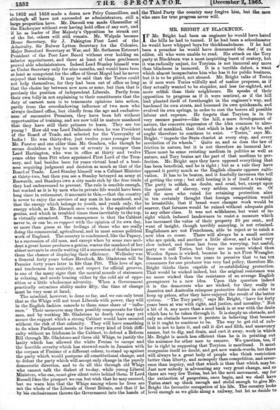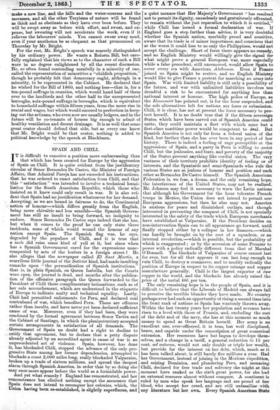HR. BRIGHT AT BLACKBURN.
I F Mr. Bright had been an engineer he would have hated the hills he had to tunnel. If he had been a schoolmaster he would have whipped boys for thickheadedness. If he had been a preacher he would have denounced the deaf ; if an editor, all who were unable to read. His attack on the Tory party at Blackburn was a most inspiriting burst of oratory, but it was radically unjust, for Toryism is not immoral any more blindness is immoral.. It is a terrible defect, a want which aheest incapacitates him who has it for public business, but it is to be pitied, not abused. Mr. Bright talks of Tories as if men were Tories wilfully and of malice prepense, as if they actually wanted to be stupider, and leas far-sighted, and more selfish than their neighbours. He speaks of their opposition to progress as if it were sentient, as if the hill had planted itself of forethought in the engineer's way, and hardened its own strata, and loosened its own quicksands, and evolved its own springs, in order to cost the borers all possible labour and expense. He forgets that Toryism is in its very essence passive—like the hill, a mere development of nature, the concrete expression of the idea common to nine- tenths of mankind, that that which is has a right to be, and ought therefore to continue to exist. "Tories," says Mr. Bright, "impede the State chariot at every step, and every revolution of its wheels." Quite so, and so does the law of friction in nature, but it is not therefore an immoral law. There must be some resisting medium in politics as well as nature, and Tory brains act the part of that medium to per- fection. Mr. Bright says they have opposed everything that has been beneficial, and he is right ; but as a rule they have opposed it pretty much as the English climate opposes culti- vation. It has to be beaten, and it fearfully increases the toil of getting the crop ; but still beating it is of itself a training. The party is selfish, no doubt, and crue], but, except upon the question of slavery, very seldom consciously so. Of all the men who voted for retaining protection nine in ten certainly thought that foreign competition would be irresistible, that if bread were cheaper work would be scarcer, that farmers would be ruined without adequate gain to any other class. It was not selfishness, but want of in- sight which induced landowners to resist a. measure which has increased the value of their property 20 per cent., and want of insight, though terribly annoying, is not criminal. Englishmen are not Frenchmen, able to reject or to catch a new idea en mane. There will always be a small section who are quick, and another a little slower, and a third very slow indeed, and these last form the worrying, but useful, party we call Tories, but they are no more wicked than Wooden Spoon is wicked, because he is not First Wrangler. Because it took Tories ten years to perceive that to tax ten consumers for one producer was very bad policy, therefore Mr. Bright thinks them capable of re-establishing protection. That would be wicked indeed, but the original resistance was no more wicked than the resistance of an average English greengrocer to a new idea. Upon this question indeed it is the democrats who are wicked, for they really in America and Australia reimpose protective duties in order to keep up prices, after they have enjoyed the result of the better system. "The Tory party," says Mr. Bright, "have for forty years been at war with right, and justice, and morality." Not a bit of it, any more than a mud bank is at war with the drain which has to be taken through it. It is simply an obstacle, and only an obstacle because it persists in believing that because it is it ought to continue to be. The way to get rid of rub- bish is not to hate it, and call it dirt and filth, and unsavoury but to dig, and drain, and cart it away, work in which Mr. Bright is much less efficient than he is in pointing out the nuisance for other men to remove. We question, too, if he is right in supposing that Toryism is moribund. It must reorganize itself no doubt, and get new watch-words, but there will always be a great body of people who think restriction better than liberty, and monopoly than competition, and rever- ence than inquiry, and that which is than that which may be. Just now nobody is advocating any very great change, and so there are very few Tories, but let the next movement, say for the extinction of pauperism, once begin, and we shall have Tories start up thick enough and stolid enough to give Mr. Bright the favourite occupation of his life. The country looks level enough as we glide along a railway, but let us decide to
make a new line, and the hills and the water-courses and the morasses, and all the other Toryisms of nature will be found as thick and as obstinate as they have ever been before. They will be swept away as before with effort, and sweat, and ex- pense, but swearing will not accelerate the work, even if it relieves the labourers' minds. You cannot swear away mud, even if your anathema be as eloquent as that pronounced on Thursday by Mr. Bright.
For the rest, Mr. Bright's speech was scarcely distinguished by his ordinary power. He wants a Reform Bill, but care- fully explained that his views as to the character of such a Bill were in no degree enlightened by all the recent discussion. He, so- often found contending manfully in a minority of one, called the representation of minorities a "childish proposition," though he probably felt that democracy ought, although in a minority, to be represented in the Cabinet. He declared that he wished for the Bill of 1860, and nothing less—that is, for a ten-pound suffrage in counties, which would hand half of them over to the landlords and the other half to the unrepresented boroughs, asix-pound suffrage in boroughs, which is equivalent to household suffrage within fifteen years, from the mere rise in rental and wages, but which would succeed to perfection in keep- ing out the artisans, who even now are usually lodgers, and in the future will be co-tenants of houses big enough to admit of healthy ventilation and decent drainage. It is as well that some great orator should defend that side, but as every one knew that Mr. Bright would be that orator, nothing is added to political knowledge by the speech at Blackburn.



































 Previous page
Previous page